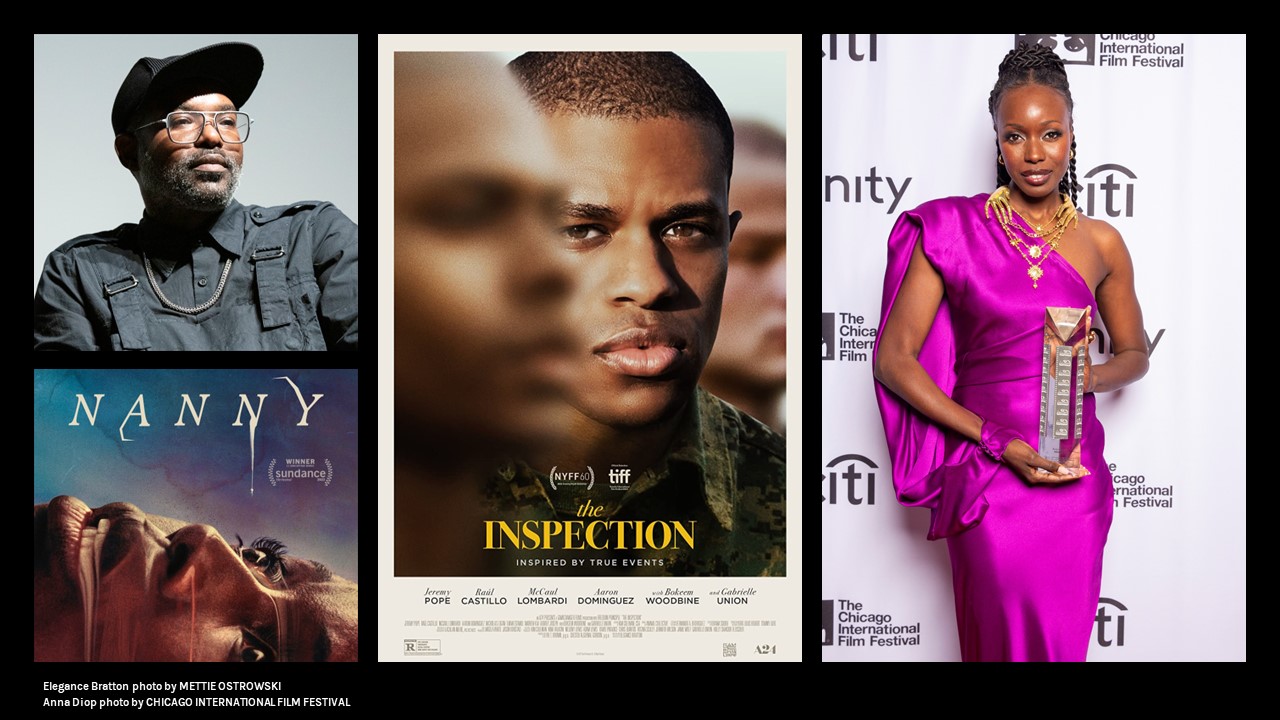As we enter the holiday movie season, high-profile Oscar hopefuls enjoy costly studio marketing campaigns, a smattering of publicity and viral word-of-mouth declaring them must-sees. Meanwhile, many smaller films of quality lack such resources, struggling for audience attention and awards traction, relying on film festival buzz and critical acclaim to keep them in theaters and their hopes for recognition alive.
A pair of upcoming films recently featured on the 58th Annual Chicago International Film Festival fit this bill, both revealing breakout talents—a writer-director delivering a powerful examination on personal identity and self-acceptance derived from his own search for self, and an actress paying tribute to her real-life immigrant mother in a shivery parable about how capitalism traps women of different cultures and economics.
In The Inspection (November 18, theatrical), forty-three-year-old Elegance Bratton (Pier Kids) dramatizes an important chapter from his younger life—enlisting in the U.S Marine Corps. as a gay Black man determined to make his way after a decade of homelessness before earning hard-won community and belonging. What he truly longs for is the elusive acceptance from a mother who, as she painfully tells him, could love him but could never love what he was.
Bratton, who learned filmmaking in the Marines and post-military went on to Columbia University and Tisch School of the Arts before becoming a successful photographer and documentarian, works in a lyrical, often intimate style in his gritty, barracks-set memoir of an identity still in evolution. The recipient of three Gotham Award nominations, the film features indelible performances by stars Jeremy Pope, Gabrielle Union and Raúl Castillo, headlining a movie about need to live authentically and one, from a former documentarian, painfully authentic to his real-life struggle.
Nanny (November 23, theatrical; December 18, Amazon Prime Video), which won a top directing prize at Sundance this year, was also a personal endeavor of sorts for radiant, Gotham Award nominee Anna Diop (Us, television’s Titans), who stars as an undocumented Senegalese immigrant in Manhattan caring for the young daughter of a wealthy Upper East Side couple. While Aisha (Diop) tends to their child, her own son remains in Senegal, waiting to join his mother in the United States. An original mystery directed by Nykyatu Jusu that deploys West African folklore, social observation and the elements of a thriller, Nanny skirts genres to consider the blunt force of capitalism on women and mothers—all while mythic, intimidating specters haunt its protagonist’s nightmares.
Chicago International Film Festival Rising Star honoree Diop, whose Senegalese immigrant mother found work as a domestic while raising her daughter in Houston, plays a version of the same in a haunting movie about a symmetry between women and mothers of different means, and one with something on its mind about the exploitation of unprotected workers. Structured as a modern-day folkloric mystery, Nanny keeps us guessing until its final moments.
In a pair of recent sit-down interviews, I spent time with Elegance Bratton and Anna Diop to deconstruct these new projects, of personal significance to each yet thematically universal. A human condition drama and a social critique, The Inspection and Nanny could not be more removed in subject matter and approach, yet each provokes us to consider who we are and how we fit into our worlds.
Elegance Bratton / The Inspection
Lee Shoquist: There’s much conversation today around the need for people to be their authentic selves in order to fulfill their highest potential. In The Inspection, although your surrogate character, French, does not openly discuss his identity, he never feels the need to hide. I think he’s aware that people understand. In that challenging setting, he is who he is. And he ultimately triumphs.
Elegance Bratton: I have been fatigued with the coming out story. Many have been instrumental in helping me become my true self and there are many more to be made. This one is based on my true story. My name is Elegance, and almost every room I have walked into in my entire life everyone has assumed I am gay—and they were right. So to me this isn’t as much about hiding as it is about, ‘I know who I am.’ At that time, I knew who I was, but I didn’t know how to be in the world as myself. So it’s about finding space for your true self. I think that is what this movie is about. It’s not about discovering who you are. It’s about owning who you are.
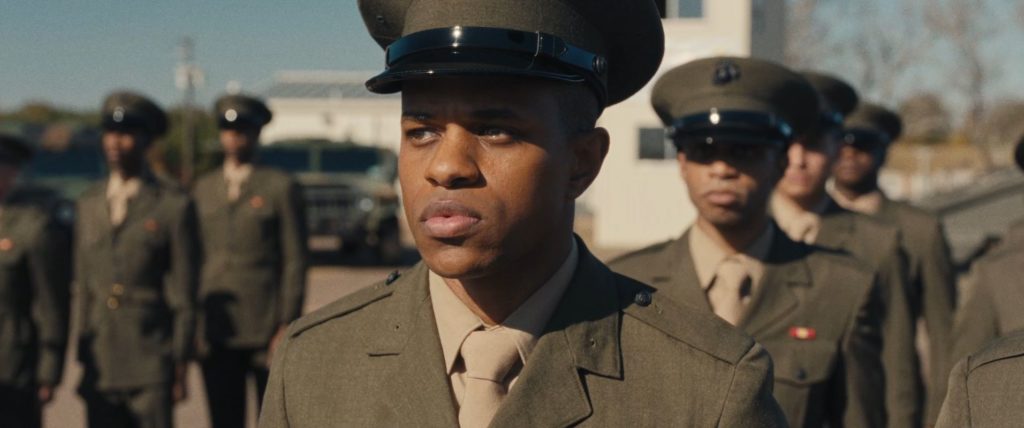
LS: When you talk about becoming yourself, has it been a lifelong project? Perhaps it started as a child in Jersey City and continued through your ten-year period of finding your way as a young adult. Seeing the film, I wonder if you are still processing this.
EB: Yes. I think becoming yourself is a lifelong project for every person; for an artist it’s a bit more intensified. There is this great quote in the movie Paris is Burning about how being a Black gay man is the greatest behavioral social experiment in the history of the world. There’s really no template! So for this movie it was intentional to cast Jeremy Pope. It had to be him. He’s phenomenal and in his fairly young career he has already accomplished so much. But he’s also out, Black and queer. I didn’t want to cast an actor who was pretending to be gay. And I also didn’t want to cast an actor who was pretending to be straight. I wanted to cast somebody that other people like Jeremy and I could look at onscreen and say, ‘That’s me. I’m a hero. I’m somebody. I matter.’ I go to the movies to see myself, so it meant a lot to us.
LS: Sometimes we may believe that for a film to qualify as a “hero’s journey” it must be in the traditional or maybe commercial sense; some grand epic quest. French’s journey is a bit different and internal. What would you say is heroic about him?
EB: I think what’s heroic about him is that number one, he doesn’t give up on people. We live in a world where things are quite polarized and more often than not the left and right throw their hands up and turn their backs. French isn’t that kind of person. He’s the kind of person who is going to focus on the humanity he has and that makes him heroic. And then secondly, this is a story about somebody willing to endure any humiliation to win back his mother’s love—but ultimately learns how to love himself. And I think loving yourself makes you heroic too.
I made this movie for anybody who has ever felt downtrodden or depressed or like an outsider. I made this movie to let you know that you’re enough. When I joined the Marine Corps after ten years of being homeless, I thought that I was worthless and that my life had no meaning. And then my drill instructor told me, ‘Actually, you are very important because you have the ability to protect the person to your left and to your right.’ That was a transformational idea for me. It was like, ‘Wow, I matter because nobody here could be alive without me.’ While French learns this, I think it is a lesson that’s true for every person sitting in the theater watching. We are only as important as our ability to protect one another. French owning that truth makes him heroic.
LS: Speaking of protection, I thought the scene near the end of the picture where Gabrielle Union, who plays French’s estranged mother, comes to the graduation luncheon and Bokeem Woodbine intervenes—when you talk about protecting the person on your left and right, that’s an affirming, protective moment because the unexpected embrace of the institution finally says, ‘You’re one of us.’
If you will, speak a bit about Gabrielle. I am curious about how you directed her scenes, many of which must be derived from your relationship with your mother. How do you do that without having a painful sense memory about them? It must be difficult.
EB: To a certain extent, I think artists are obsessed with sense memory. I purposely want to remember it because my mother passed about three days after the movie got green lit. So I have a lot of gratitude for Gabrielle, because my mother and I never reconciled at all. Gabby was able to bring her back to life for me and that provided an opportunity for closure. I don’t know if I would have found it if I wasn’t a filmmaker. It’s interesting how life works out, you know?
That being said, my mother was the first person to ever love me completely. She was also the first person to completely reject me. She was a complicated woman. And Gabby made space for me to grieve the loss of my mother, and for me to craft a character that was very reminiscent of her. All of the jewelry that Gabby wears in the film belonged to my mother. Her Bible in the film is my mother’s Bible. Even the style of hair that she wears is how I remember my mother being her most beautiful.
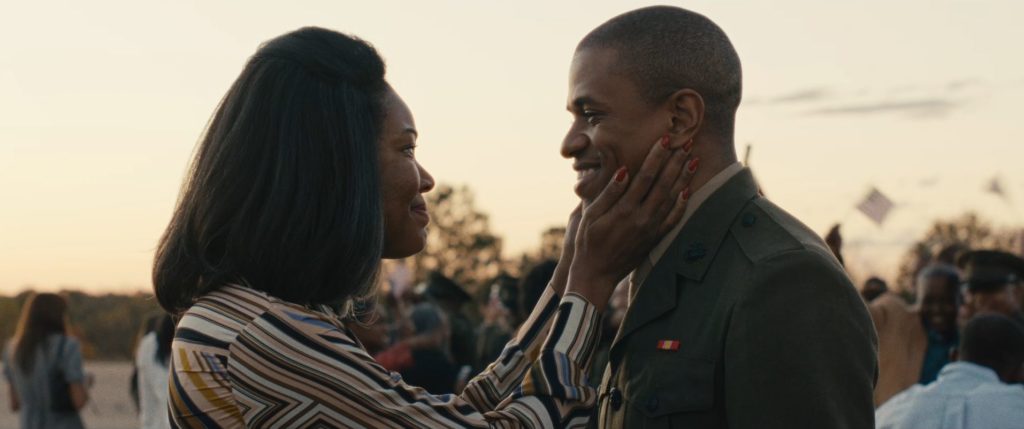
LS: Was she aware that she was carrying this sort of responsibility?
EB: Oh my god, was Gabrielle aware! First of all, she is a brilliant woman and businesswoman. She is also a producer of this film. It’s funny—I am so obsessed with making sure that my crew and actors are being taken care of that I forget about myself, and that is what the producers do sometimes, which is to make sure that you are okay. Gabby checked in with me just the other day. She is on a birthday trip to Africa, and she checked in to make sure that I was good. She was very aware of that responsibility. But it wasn’t really a responsibility. To me, her goal was not to pretend to be my mom, but to make a three-dimensional person and to add some of her own history and life to it. She brought some of her family members to that character as well. I hope that she did not feel burdened and that she felt how much I trusted her with this and how proud I am of what she delivered.
LS: That scene near the end of the film is difficult—‘I love you, but I can’t love what you are.’ I’m paraphrasing but it’s powerful. The film does not see the need to wrap that relationship up with any fulfilling closure.
EB: No. It’s 100% true and autobiographical when it comes to the hopes, fears and desires of our lead character, even if the situation itself is not exactly something I went through. Unfortunately, my mother said those words to me: ‘I just cannot love what you are.’ And another big point in the film is that forgiveness is not weakness—it’s actually strength. When she said that to me, I realized, ‘Oh my God, she doesn’t know how to do something that no one has ever done for her. No one has ever given my mother unconditional love.’ I know that Black gay kids are going through homelessness eight times more than other kids and are also eight times more likely to commit suicide. One in two of us is HIV-positive. I wanted that message to be in the film for us: ‘You know what? Loving yourself is enough.’
LS: Let’s talk for a moment about the influences on this film. You’ve mentioned Claire Denis’ Beau Travail, which came to mind for me when I saw this film. I also loved that you mentioned one my favorite commercial movies, An Officer and a Gentleman. Can you share a bit about those influences with respect to how it looks and feels, and your work with your cinematographer, Lachlan Milne?
EB: Sure, and I want to mention our incredible editor, Oriana Soddu, as well. So much of the pacing was her brainchild and I had to come around. Once I saw what she was doing I was like, ‘Oh, yeah, this is why I hired you! You’ve got it going on!’
First of all, while “Don’t Ask, Don’t Tell” got its name in the 90s, queer service members were forced to serve in silent oppression for almost eighty years cumulatively—so French could never just be me. It had to be a cinematic, visual statement about what it means to be queer in the military. So this is where Claire Denis comes in and from French’s point of view, the handheld style of the European arthouse movie. In our world, when we see (someone like) French it’s usually in a Full Metal Jacket military action film. So Lachlan and (used the handheld style) to suggest the shaky ground that queer troops have stood on for the entirety of “Don’t Ask, Don’t Tell.”
That said, it’s tough because you are in one location and real-life boot camp is emotionally very much how it feels in the film; there is a monotony to it. You do the same exercises in the same places every single day. You go to the same classroom and the same cafeteria. So from a filmmaking perspective, the question became one of how to convey the passage of time while also holding true to the fact that you are stuck in this place.
My husband, Chester, and I are photo collectors. I’m also a photographer. (Photographer) William Eggleston had this incredible book of clouds. Chester brought me that book and I was like, ‘Ah-ha! I will focus on the landscape and use it to suggest the interior development of these characters and, in so doing, assert the actual passage of time.’ So rather than having academic knowledge of how time passes I wanted experiential knowledge. When I was in boot camp, I remember going from Thanksgiving to the new year. You go to the cafeteria and look up and it has turkeys on it and it’s like ‘Oh, I guess it’s November!’ Or there’s hot chocolate and they have Santa hats on and ‘It must be Christmas!’
And this is a movie very much influenced by the photography of the great Sally Mann, a southern landscape and family photographer. Battle of Algiers is another movie influence. But I can best summarize by saying that this film is ‘Gay Black Rocky!’
LS: Rocky—a perfect movie.
EB: It is perfect. And his love of a woman, Adrian, his wife- in this film, it’s the love of his mother. But I think at the end of the day French is someone who is willing to do anything to find and secure love, and who discovers love from within. That’s enduring love.

LS: On the subject of love, I think anyone would fall for Raúl Castillo (laughter). Tell me a bit about collaborating with him. I think many will wish a scene later in the film had worked out a bit differently. But it’s okay!
EB: First of all, Raúl gives me Marlon Brando energy and A Streetcar Named Desire is one of my favorite movies. Anything Marlon Brando is in is one of my favorite movies. Well, except for Last Tango in Paris.
You don’t love Last Tango in Paris?
I love the movie but the process of making that film was a little problematic.
LS: Because now we think about it differently given Maria Schneider’s experience.
EB: Yes, and how her life turned out. But that being said, I think this movie is about the contours of accepting masculinity and each man in boot camp is being presented with an impossible model to live up to, which is why the movie is called The Inspection—because the actual human being is being inspected against the industrial model. And Raúl speaks to an idea that was confusing to me and to French, which is one of men nurturing men. As a gay man, I had only experienced the essence of that through sex. French finds himself in this transactional understanding of what a relationship is: ‘If you do something kind for me, I will owe you something.’ So I needed an actor like Raúl Castillo, who has that austerity but also that tenderness; someone for whom watching him empathize you get to see the transition from that rock hard, unapproachable masculinity into something much softer and more subtle. The fact that this beautiful Latin man has all these dimensions to him…
LS: And can believably convey that his character understands and can accommodate French.
EB: Yes! That is why Raúl had to be in the movie. I had to have that soft-hard kind of vibe. And mind you, most of our troupe, outside of Bokeem and Gabby, were theatrical actors first. The idea of putting a scene on its legs and exploring it in real time is so natural to them. So Raúl is a young, rising Broadway star in that capacity as well.
LS: What’s the best part about your job?
EB: Being a director? Oh, wow. Man, there are so many things I love about directing films. I love it all. For this film, the best part about being a director, honestly, is that I now have proof in the world for myself that I have gotten through what I have been through and that I am no longer there. Anybody who has ever dealt with homelessness knows it is always in the back of your mind. You’ll do anything not to go back there. And now I have proof that I’ve gotten through it and the best part is that it is also proof to anyone else going through it that they can get through it too. Whatever you are going through in your life—whether you are gay or Black is irrelevant. As human beings we are all going through struggles. And I think this is a character that can make you look inside yourself and say, ‘I think I have a little bit more to give.’
Anna Diop / Nanny
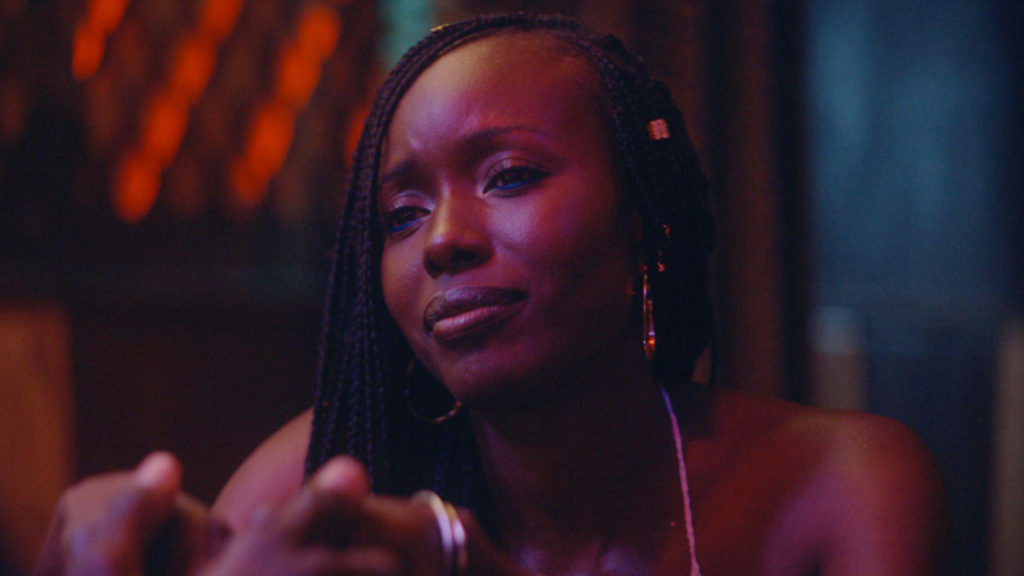
Lee Shoquist: Nanny is quite an original film. It also has a personal dimension for you.
Anna Diop: It does! Yes, in so many ways it is my mother’s story. She emigrated from Senegal to Houston when I was five years old. And she did it for the same reason (my character) Aisha does, which was to give me an opportunity to build a better life than the one that we had in Senegal and certainly the one that she grew up in. I love my mother and have always been very aware of the sacrifices she made and the strength it took to do all of these things. It was an honor to be able to tell her story this way. And it’s not just her story, but the story of so many immigrant families and particularly women.
LS: Has your mother seen the film?
AD: Mm-hmm.
LS: And her reaction was?
AD: Gorgeous! Yes.
LS: Did she feel like you were, in a way, playing her?
AD: (Laughs) In a way, yes! My mother is so funny, though. She brought up the most random things, like the headscarf I was wearing in the film not sitting exactly right on my head; silly little things like that. But she was really moved by it, and she loved the film.
LS: Did she know all of the West African folklore so integral in the film?
AD: My mother is very deep into that. Growing up—and even still—she has me douse myself with holy water and she gives me little pieces of jewelry and things to wear and put on myself for protection or to attract good spirits. My mother is very about that life. Similarly to Aisha, I have never really leaned into it or believed it as much, though I respect and understand where she is coming from. But yes, she has always been very in tune with all of that.
LS: Effective thrillers over the decades tap into social anxieties felt at a given point in time or history. This film exists in a moment where there is a dialogue about immigration. The mystery/thriller elements and the social theme are well balanced. I loved the notion here of an immigrant mother who is not able to raise her child because of economic circumstances. And then there’s another mother, an American played by Michele Monaghan, who is also not really raising her own child. They are trapped in capitalist structures preventing it.
AD: Yes, you just said it. That is so beautifully said. Nykyatu also says that in a capitalistic society no one wins. What she means by that and what is reflected in the film is that (American mother) Amy has to hire someone to care for her child because of the demands of her job, so that she can keep up in the society and make the kind of money that she feels is necessary to give her child and family the life they need and want. And of course, Aisha has to leave her child in order to do the same thing—to save up money and create a life. Both of these women are abandoning the most precious things in their lives in order to survive in a capitalistic landscape.
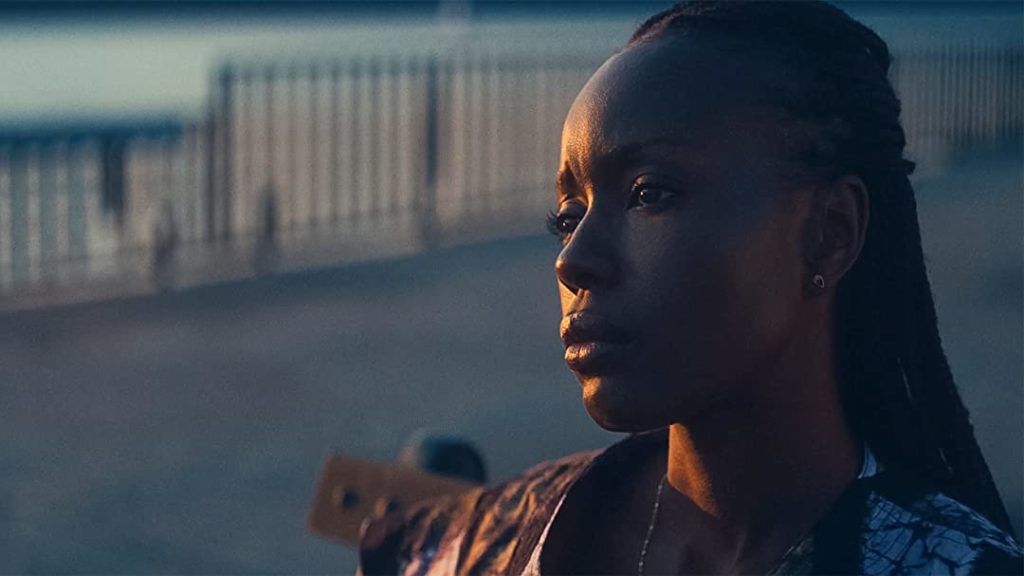
LS: Yet the men in both of their lives are gone. They have abdicated responsibility for the whole idea of child raising. And the film says that women bear the hardships of both backbreaking work and the responsibility of child raising—on their own.
AD: Yes, you also just brought up two parallels between the two women that are quite profound as well.
LS: If we just looked on the surface we might think the women are at odds with each other. But if we look more closely we can see they are both being exploited.
AD: Totally.
LS: Was this part of your initial conversations?
AD: Yes, during pre-production. We explored those dynamics and the push-pull between the characters, but on a more macro-level each of us—Nykyatu, Michele and me—understood these dynamics because we are surviving them too.
LS: The French word for survivor, as you say in the film.
AD: Yes, survivante. That’s right! It’s not just Aisha that’s surviving but Amy too, to the best of her ability. But Nykyatu is very profound in saying that in each of the characters there is a part of herself. We had an amazing Q&A a few weeks ago and a Black immigrant said, ‘This was confronting to me, because I found at this point in my life and career and success that I am more of an Amy than I am of an Aisha.’ The film isn’t judging the characters, but it is reflecting what a society looks like that is built on such values.
LS: We see a lot written today about women having parity with men economically, gender balance in the workplace and more. We do not necessarily see what the cost of this can be sometimes for women. The film shows that.
AD: Yes. Absolutely. And you know what? We all benefit from these individuals that work domestic jobs. Amy is able to pay Aisha a small sum of her income so that she can go and make a great sum. But there is natural exploitation there—she is able to do what she wants to do because Aisha (provides her services) at a particular rate.
LS: I’m glad you said that. I think the immigrant exploitation in the film is fairly pointed. At the beginning of the film, we are told by the aunt character that it’s important to hold onto the job; not to do anything to lose it. So I think that is the fear. If you have a job like that, working for a wealthy family on the Upper East, if they don’t pay you on time or the money is not coming you still are forced to “play nice” and hang in there. You don’t have any protections, especially if you are undocumented like Aisha.
AD: One hundred percent. It’s a very vulnerable and fragile position to be in and unfortunately some of these people know that and they take terrible advantage of it as we see happen in the film. But what I love about Aisha is that even though she is in a vulnerable, fragile position and knows how much she needs this job, she still has her integrity and dignity.
LS: Yes, as when she says, ‘The overnight will be $250.’
AD: Yes! It’s going to be $250. ‘This is what I am owed.’ When she is told, ‘Okay, we will pay you this advance’ she says, ‘It’s not an advance. It’s what I’m owed.’ She still maintains a fierceness and integrity which I loved.

LS: What was it like working with the great Leslie Uggams?
AD: Oh my gosh! I love Chicago—asking about Leslie Uggams, and rightfully so! She’s an icon and so gracious.
LS: Commanding the screen in a small role and running with it.
AD: And blowing it up! In between takes and lunch breaks I would always sit right beside her, and she would tell me about the loves she’s had and the places she’s been. She has lived many lives and accomplished so much.
LS: As always, such a regal quality.
AD: Yeah! She is so gracious and would always take time to chat with me. When I did my first take with her—we didn’t have any rehearsals with Leslie, she just came in and destroyed all of us with her brilliance—I was so taken in the scene because she has such a gravity to her. You see it in the film. It’s so immense. She embodies that sage, all-knowing presence.
LS: What’s the best part about your job?
AD: Oh my gosh. It’s creating things that are ascending us as a culture. It is so important to have these kinds of protagonists, not just for the individuals that look like this but especially for those that don’t, so that we all know how similar and alike we are. Art has always ascended humanity and I am honored to be a part of that.
